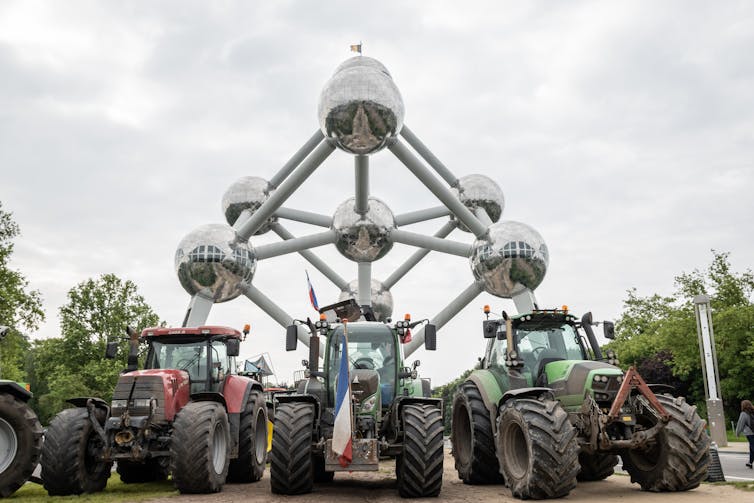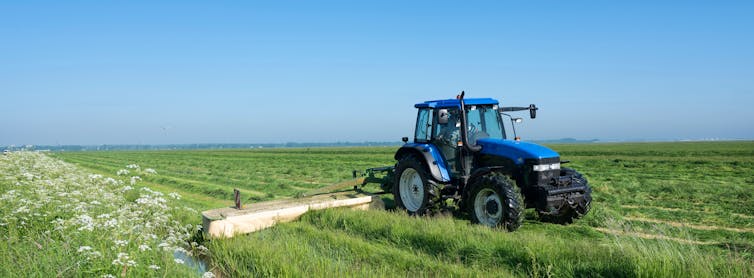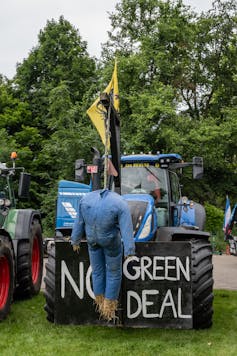A few days before the recent European parliamentary elections, an event took place that hardly made it into the news anywhere: a dozen tractors, escorted by police, rolled into Brussels, honked their horns outside the EU parliament, and drove away.
Tractors in Brussels are nothing new. Over the last year, we have gotten used to images of farmers protesting against environmental policies by disrupting traffic and burning tyres on the side of busy roads. But this protest was different.
The few newspapers that reported the protest described it as a failure. Although the tractors that drove to the parliament later met up with a few hundred others, and over a thousand people, in the outskirts of Brussels, the number of participants was much smaller than had been expected.
The big actors in European farming had distanced themselves from the event. Copa-Cogeca, the organisation that claims to represent the united voice of European farmers, said that none of its members participated.
The organiser was instead a more radical association, the Farmers Defence Force from the Netherlands, which collaborated with similar groups from seven countries. Several representatives from far-right parties including the Flemish Vlaams Belang and Poland’s PiS were among the speakers.

It’s still worth paying attention to this “failed” protest, because it may indicate that the far-right aims to challenge one of the most powerful actors in EU policymaking: the agro-industrial lobby. If so, European politics is about to get even messier – and whoever wins the fight, the environment will lose.
The parliamentary elections
The European election results alone are a cause for concern for environmentalists. The far-right parties were successful – together they now make up nearly a quarter of MEPs – while conservatives made smaller gains. The centre-left, liberal and green groups lost seats, which may force the European Commission to back down from important reforms.
Five years ago, the EPP (the conservative group of MEPs in the European parliament) and the centre-left S&D coalition agreed to jointly support Ursula von der Leyen’s bid to become the commission’s president. Behind the scenes, they negotiated the terms before the commission eventually presented the Green Deal as a cohesive strategy to decrease Europe’s climate emissions to net zero by 2050.
But the power struggle continued. The EPP spent the following five years obstructing these Green Deal reforms, with the help of Copa-Cogeca and the tractor protests.
This time, the EPP has gained ten new seats in the parliament, and S&D has lost four. While this is likely to tip the balance in favour of more conservative politics, both groups also face a challenge from the growing far-right.
The lobby’s three faces of power
For decades, Copa-Cogeca has influenced EU policymaking like no other lobby group. It is a textbook case of an organisation using what the sociologist Steven Lukes has called “the three faces of power”.

First, Copa-Cogeca secured an exceptional status for agriculture and rural development as the recipient of between a third and a half of the EU’s budget, long before the farmers’ lobby confronted environmental policies.
It then applied the second face of power, agenda setting, by maintaining close connections to DG AGRI (the branch of the commission responsible for agricultural policy) and the parliament’s agricultural committee, where law proposals are drafted.
The third face of power is, however, the most insidious – when it is exercised discursively or ideologically. Power is most effective, Lukes suggests, when you can influence people’s minds so that they never question whose interests a certain action or decision serves.
The agro-industrial lobby found the perfect way to dominate the discourse on agriculture. By insisting that domestic mass production of food is not a special interest but a vital security concern, the lobby has made it all but impossible to question the high priority given to mass-scale agriculture.
Every year, European farmers produce more food. While the lobby insists the EU is too dependent on imports to handle potential disruptions of supply chains, Europe currently throws away more food than it imports.
‘A huge mistake’
The Green Deal challenged the agro-industrial lobby. Not only did the commission insist that food security needed to be combined with sustainable farming, it circumvented the committees and branches where the lobby had connections. Russia’s invasion of Ukraine, however, helped the lobby regain the upper hand. After a week, the commission folded and promised to ease the environmental standards imposed on farmers.

Several environmental groups have criticised the commission’s shift. Marco Contiero, spokesperson for agricultural issues at Greenpeace, called it “a huge mistake” and warned that “all of society will pay a high price”.
The EC’s climate commissioner, Wopke Hoekstra, recently said that agricultural reforms would be the focus again as soon as the elections were over. The idea was to find a less confrontational approach, and involve farmers in dialogues about how the Green Deal could be implemented fairly. But the election results may now make that more difficult.
The challenge from the far-right
While the traditional organisations and parties still dominate the debate on rural and agricultural policies, the far-right may soon catch up. Then what?
The EPP group will face challenges from the centre-left on one side and the far-right on the other. The agro-industrial lobby, meanwhile, needs to convince farmers to participate in coordinated efforts and not follow the far-right’s populism.
The most hopeful scenario for environmentalists is that this challenge will also push the lobby to appear more cooperative in the transition to sustainable farming. But this would require that farmers recognise that, in the long run, securing food requires caring for the environment.

Don’t have time to read about climate change as much as you’d like?
Get a weekly roundup in your inbox instead. Every Wednesday, The Conversation’s environment editor writes Imagine, a short email that goes a little deeper into just one climate issue. Join the 30,000+ readers who’ve subscribed so far.

